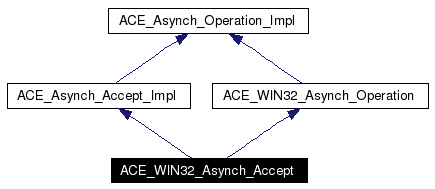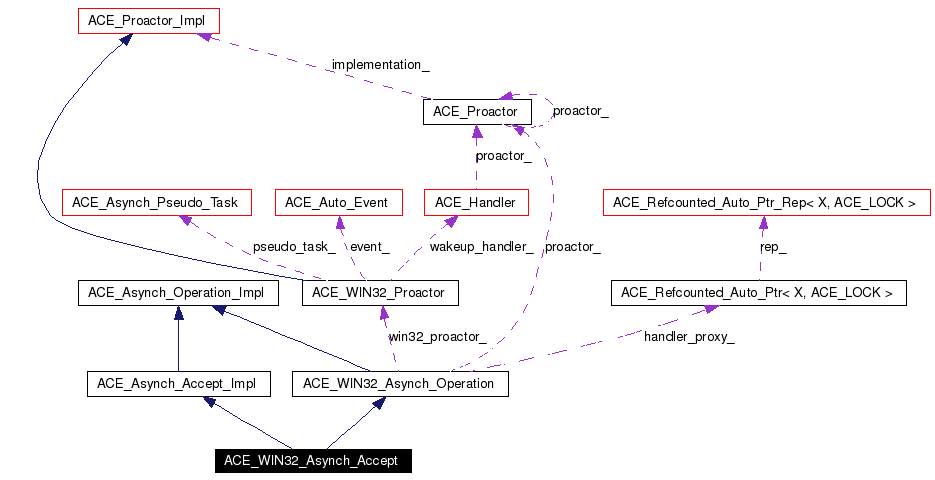
#include <WIN32_Asynch_IO.h>
Inheritance diagram for ACE_WIN32_Asynch_Accept:


Public Member Functions | |
| ACE_WIN32_Asynch_Accept (ACE_WIN32_Proactor *win32_proactor) | |
| Constructor. | |
| int | accept (ACE_Message_Block &message_block, size_t bytes_to_read, ACE_HANDLE accept_handle, const void *act, int priority, int signal_number=0, int addr_family=AF_INET) |
| ~ACE_WIN32_Asynch_Accept (void) | |
| Destructor. | |
| int | open (const ACE_Handler::Proxy_Ptr &handler_proxy, ACE_HANDLE handle, const void *completion_key, ACE_Proactor *proactor) |
| int | cancel (void) |
| ACE_Proactor * | proactor (void) const |
| Return the underlying proactor. | |
Once is called, multiple asynchronous s can started using this class. A ACE_Asynch_Accept::Result will be passed back to the when the asynchronous accept completes through the <ACE_Handler::handle_accept> callback.
Definition at line 1085 of file WIN32_Asynch_IO.h.
|
|
Constructor.
Definition at line 2028 of file WIN32_Asynch_IO.cpp.
02029 : ACE_Asynch_Operation_Impl (), 02030 ACE_Asynch_Accept_Impl (), 02031 ACE_WIN32_Asynch_Operation (win32_proactor) 02032 { 02033 } |
|
|
Destructor.
Definition at line 2160 of file WIN32_Asynch_IO.cpp.
02161 {
02162 }
|
|
||||||||||||||||||||||||||||||||
|
This starts off an asynchronous accept. The asynchronous accept call also allows any initial data to be returned to the . Upto will be read and stored in the . The will be used for the call. If ( == INVALID_HANDLE), a new handle will be created. must be specified. This is because the address of the new connection is placed at the end of this buffer. Implements ACE_Asynch_Accept_Impl. Definition at line 2036 of file WIN32_Asynch_IO.cpp. References ACE_WIN32_Asynch_Accept_Result::accept_handle(), ACE_DEBUG, ACE_ERROR_RETURN, ACE_LIB_TEXT, ACE_NEW_RETURN, ACE_NOTSUP_RETURN, ACE_OS::closesocket(), ACE::debug(), ACE_WIN32_Asynch_Accept_Result::listen_handle(), LM_ERROR, ACE_WIN32_Asynch_Accept_Result::message_block(), ACE_OS::set_errno_to_last_error(), ACE_OS::socket(), ACE_Message_Block::space(), and ACE_Message_Block::wr_ptr().
02043 {
02044 #if (defined (ACE_HAS_WINNT4) && (ACE_HAS_WINNT4 != 0)) || (defined (ACE_HAS_WINSOCK2) && (ACE_HAS_WINSOCK2 != 0))
02045 // Sanity check: make sure that enough space has been allocated by
02046 // the caller.
02047 size_t address_size =
02048 #if defined (ACE_HAS_IPV6)
02049 addr_family == AF_INET ? sizeof (sockaddr_in) : sizeof (sockaddr_in6);
02050 #else
02051 sizeof (sockaddr_in);
02052 #endif /* ACE_HAS_IPV6 */
02053 address_size += 16; // AcceptEx requires address size + 16 (minimum)
02054 size_t available_space = message_block.space ();
02055 size_t space_needed = bytes_to_read + 2 * address_size;
02056 if (available_space < space_needed)
02057 ACE_ERROR_RETURN ((LM_ERROR, ACE_LIB_TEXT ("Buffer too small\n")), -1);
02058
02059 // WIN Specific.
02060
02061 // AcceptEx API limits us to DWORD range.
02062 if (bytes_to_read > MAXDWORD)
02063 {
02064 errno = ERANGE;
02065 return -1;
02066 }
02067 DWORD dword_bytes_to_read = static_cast<DWORD> (bytes_to_read);
02068
02069 int close_accept_handle = 0;
02070 // If the <accept_handle> is invalid, we will create a new socket.
02071 if (accept_handle == ACE_INVALID_HANDLE)
02072 {
02073 accept_handle = ACE_OS::socket (addr_family,
02074 SOCK_STREAM,
02075 0);
02076 if (accept_handle == ACE_INVALID_HANDLE)
02077 {
02078 if (ACE::debug ())
02079 {
02080 ACE_DEBUG ((LM_ERROR,
02081 ACE_LIB_TEXT ("%p\n"),
02082 ACE_LIB_TEXT ("ACE_OS::socket")));
02083 }
02084 return -1;
02085 }
02086 else
02087 // Remember to close the socket down if failures occur.
02088 close_accept_handle = 1;
02089 }
02090
02091 // Common code for both WIN and POSIX.
02092 ACE_WIN32_Asynch_Accept_Result *result = 0;
02093 ACE_NEW_RETURN (result,
02094 ACE_WIN32_Asynch_Accept_Result (this->handler_proxy_,
02095 this->handle_,
02096 accept_handle,
02097 message_block,
02098 bytes_to_read,
02099 act,
02100 this->win32_proactor_->get_handle (),
02101 priority,
02102 signal_number),
02103 -1);
02104
02105 u_long bytes_read;
02106
02107 // Initiate the accept.
02108 int initiate_result = ::AcceptEx ((SOCKET) result->listen_handle (),
02109 (SOCKET) result->accept_handle (),
02110 result->message_block ().wr_ptr (),
02111 dword_bytes_to_read,
02112 static_cast<DWORD> (address_size),
02113 static_cast<DWORD> (address_size),
02114 &bytes_read,
02115 result);
02116 if (initiate_result == 1)
02117 // Immediate success: the OVERLAPPED will still get queued.
02118 return 1;
02119
02120 // If initiate failed, check for a bad error.
02121 ACE_OS::set_errno_to_last_error ();
02122 switch (errno)
02123 {
02124 case ERROR_IO_PENDING:
02125 // The IO will complete proactively: the OVERLAPPED will still
02126 // get queued.
02127 return 0;
02128
02129 default:
02130 // Something else went wrong: the OVERLAPPED will not get
02131 // queued.
02132
02133 if (close_accept_handle == 1)
02134 // Close the newly created socket
02135 ACE_OS::closesocket (accept_handle);
02136
02137 // Cleanup dynamically allocated Asynch_Result.
02138 delete result;
02139
02140 if (ACE::debug ())
02141 {
02142 ACE_DEBUG ((LM_ERROR,
02143 ACE_LIB_TEXT ("%p\n"),
02144 ACE_LIB_TEXT ("AcceptEx")));
02145 }
02146 return -1;
02147 }
02148 #else /* ACE_HAS_WINNT4 .......|| ACE_HAS_AIO_CALLS */
02149 ACE_UNUSED_ARG (message_block);
02150 ACE_UNUSED_ARG (bytes_to_read);
02151 ACE_UNUSED_ARG (accept_handle);
02152 ACE_UNUSED_ARG (act);
02153 ACE_UNUSED_ARG (priority);
02154 ACE_UNUSED_ARG (signal_number);
02155 ACE_UNUSED_ARG (addr_family);
02156 ACE_NOTSUP_RETURN (-1);
02157 #endif /* (defined (ACE_HAS_WINNT4) && (ACE_HAS_WINNT4 != 0)) || (defined (ACE_HAS_WINSOCK2) && (ACE_HAS_WINSOCK2 != 0)) || (defined (ACE_HAS_AIO_CALLS) */
02158 }
|
|
|
This cancels all pending accepts operations that were issued by the calling thread. The function does not cancel asynchronous operations issued by other threads. Reimplemented from ACE_WIN32_Asynch_Operation. Definition at line 2181 of file WIN32_Asynch_IO.cpp. References ACE_WIN32_Asynch_Operation::cancel().
02182 {
02183 return ACE_WIN32_Asynch_Operation::cancel ();
02184 }
|
|
||||||||||||||||||||
|
Initializes the factory with information which will be used with each asynchronous call. If ( == ACE_INVALID_HANDLE), <ACE_Handler::handle> will be called on the to get the correct handle. Reimplemented from ACE_WIN32_Asynch_Operation. Definition at line 2169 of file WIN32_Asynch_IO.cpp. References ACE_WIN32_Asynch_Operation::open(), and ACE_Handler::Proxy_Ptr.
02173 {
02174 return ACE_WIN32_Asynch_Operation::open (handler_proxy,
02175 handle,
02176 completion_key,
02177 proactor);
02178 }
|
|
|
Return the underlying proactor.
Reimplemented from ACE_WIN32_Asynch_Operation. Definition at line 2187 of file WIN32_Asynch_IO.cpp. References ACE_WIN32_Asynch_Operation::proactor().
02188 {
02189 return ACE_WIN32_Asynch_Operation::proactor ();
02190 }
|
 1.3.6
1.3.6